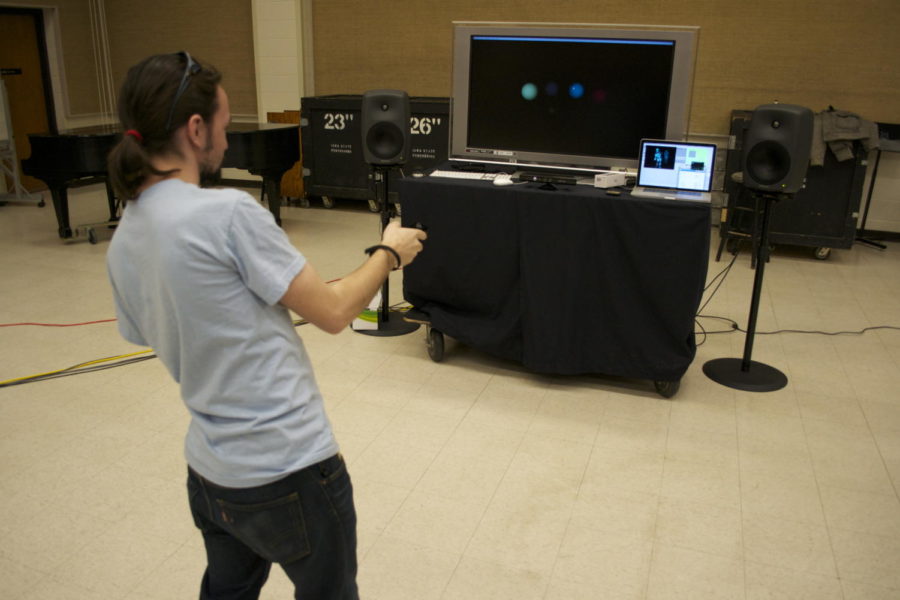Minor in music technology: 5 years later
Darren Hushak is working with Xbox Kinect, a motion and sound-sensing input device.
October 16, 2014
Five years after its implementation, the minor in music technology has proven to be very successful. Its creator, Dr. Christopher Hopkins, and music department adviser Kevin Judge have witnessed high enrollment and completion of the required coursework supporting its popularity among students.
The program is designed to help students creatively apply the use of technology in areas such as sound editing, processing, programing computer based musical instrument interfaces, synthesis techniques and electronic music composition.
“I came here to develop it and I got started on that in 2004. Most of the work was done in 2005 and it was reviewed on many levels from the department to the college and the provosts’ office all the way for the final approval; the board of regents,” said Hopkins. “It goes through a long process of development and that really was finalized at just the beginning of 2009.”
While this process was happening there were students who were completing, or had already completed, the coursework that would be needed for the minor. After the minor was approved and implemented in early 2009, the first group of students with this minor graduated a couple months later.
The usual process for completing a minor is a set of core courses and elective courses that add up to 15 total credits. Typically there are only a handful of elective courses to choose from, but the minor in music technology has 34 elective course options.
This gives students much more diversity in the areas they want to study under the broad idea of music technology. The enrollment numbers and amount of students declaring this minor are very high because of this diversity.
“It has been very popular and the evidence for that is the introductory course is fully populated. In fact I am often advising students to on their first day of registration get into that introduction to music technology course because it actually does close in days,” Hopkins said.
Because there is limited availability, students sometimes have to rearrange when they take some of their electives. Hopkins has also found that with this popularity, he believes close to 100 percent of students who start this minor complete it.
This minor has appealed to students outside of the music department as well according to adviser Kevin Judge.
“The minor in music technology is a popular minor, especially with students who are currently taking computer science and-or electrical engineering courses. There are many classes that overlap in these two disciplines that allow students to graduate with a minor in music technology without taking too many more credits,” Judge said.
Darren Hushak, Iowa State graduate of 2014, was a double major in electrical engineering and computer engineering as well as a double minor in music and music technology. Hushak’s experience with the minor wasn’t what he initially thought it would be but it led him to areas of study that he was unaware about.
“I went into it thinking I’d learn how to record rock bands by the end of it. It wasn’t exactly the studio arts minor I thought it would be, but rather a series synthesis design and electronic music composition courses,” said Hushak.
“Ultimately, however, it gave me a much deeper understanding of digital audio and ways to manipulate it that furthered my mixing and recording abilities in ways I couldn’t have thought of. In short, I really didn’t know what I didn’t know,” Hushak said.
Because of the success and popularity of the minor in music technology there is always talk about expansion and growth after just five years since its implementation.







